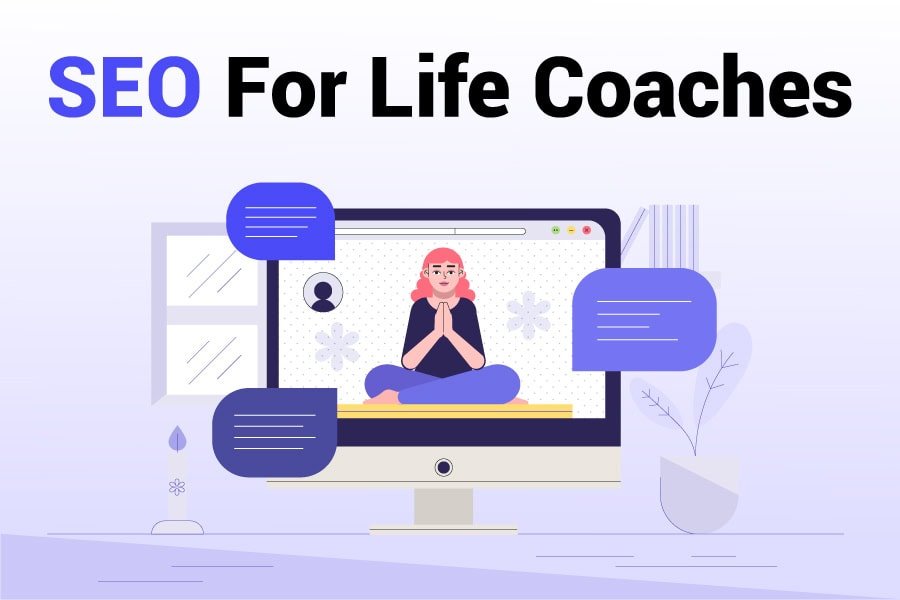
Do you want to learn about SEO for life coaches and how it can transform your coaching business? If yes, you have come to the right place!
Life coaches change lives. They help people nurture a healthy relationship with themselves and others. However, life coaching is a highly competitive field. Coaches are looking for new clients every single day.
As a life coach, how do you plan to get clients? Have you tried SEO? If you haven’t or have but didn’t get the results you seek, then you didn’t do it properly.
Life coach SEO will make your website rank high in search engines (Google, Bing, Yahoo, etc) and get more qualified website traffic.
Most coaches will say, “but, I hired an SEO agency and didn’t get positive results.” Why? Good question! Perhaps, the SEO agency you hired isn’t competent enough.
Here, you’ll get tips on how to do SEO for coaches to improve ranking and acquire more website visitors. Keep reading for more details.
What Is SEO For Life Coaches?
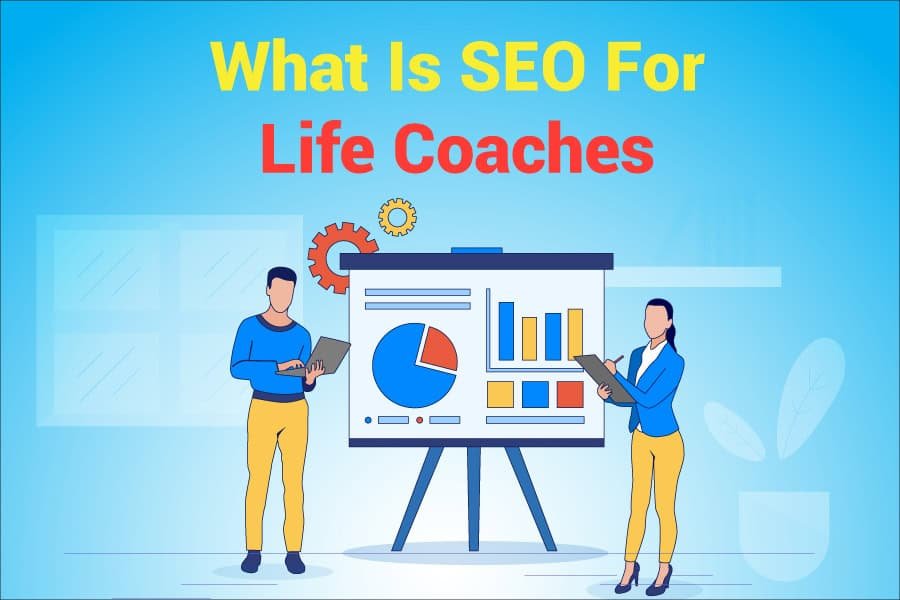
SEO involves strategies performed on and off a website to boost ranking, organic traffic, and credibility. SEO can also create brand awareness and improve your online popularity.
As a life coach, becoming popular online will significantly impact your career. When you’re famous, coaching clients wouldn’t mind paying a premium for your services.
Search optimization involves using various SEO Strategies to make a website search engine and user-friendly . These include:
·On-page
·Off-page
·Technical SEO
·Local SEO
When you focus on these four areas, you’ll properly optimize your website. Proper optimization is necessary to rank high in the search engine results pages, making it easier for potential clients to find your life coach website.
So, search engine optimization involves a combination of strategies designed to make it easier for potential clients to find a business online.
Is Life Coach SEO Important?
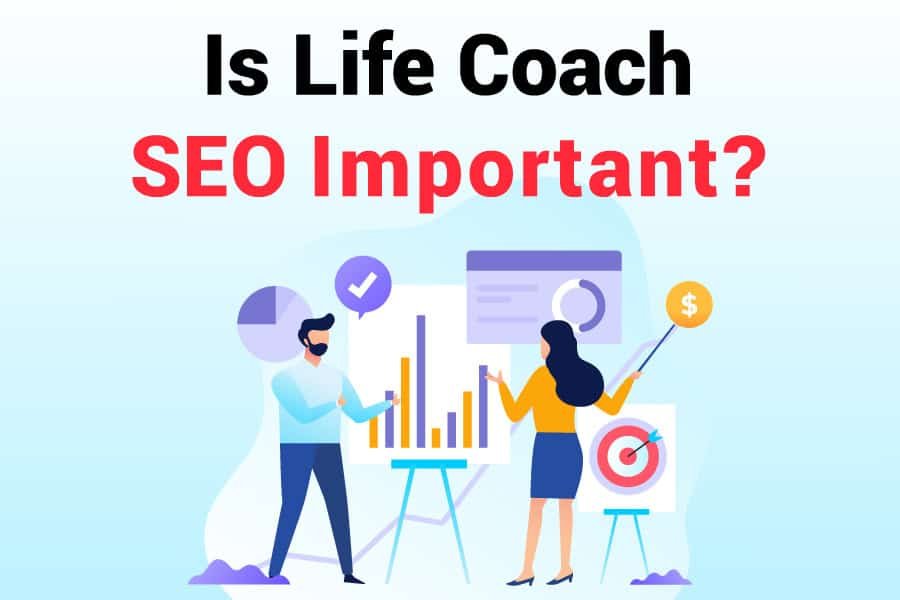
Yes, it is essential for individuals in the coaching niche who are looking for more coaching clients. But if you aren’t looking for more clients, you shouldn’t invest in SEO.
When you optimize your website correctly, you’ll get more qualified traffic. And the exciting part about SEO is that it brings qualified leads to your website.
Search engine optimization brings website visitors actively seeking those in the coaching businesses to hire. You can convert visitors seeking information about personal development coaches to paying clients. How? Populate your website with high-quality content.
Use your content to prove your worth to prospects. It doesn’t have to be promotional. Instead, publish content that will convince prospects that you’re an authority in your field.
When prospects start to see you as an authority, you’ll be the first life coach they’ll approach whenever they need help. They can also confidently recommend you to other people seeking a life coach.
If you need more clients for your life coach business (which I am sure of), consider investing in SEO.
A Handy Tip: You may not see results overnight with SEO. SEO takes time to yield results. However, its impact on your life coach business will be long-lasting. Gradually, it will take your website from the bottom to the top of the search results page.
It takes time for Google to crawl and index a page. But if you keep investing in SEO, you’ll rank high for your target keywords quickly.
How To Do Life Coach SEO: Things You Must Know
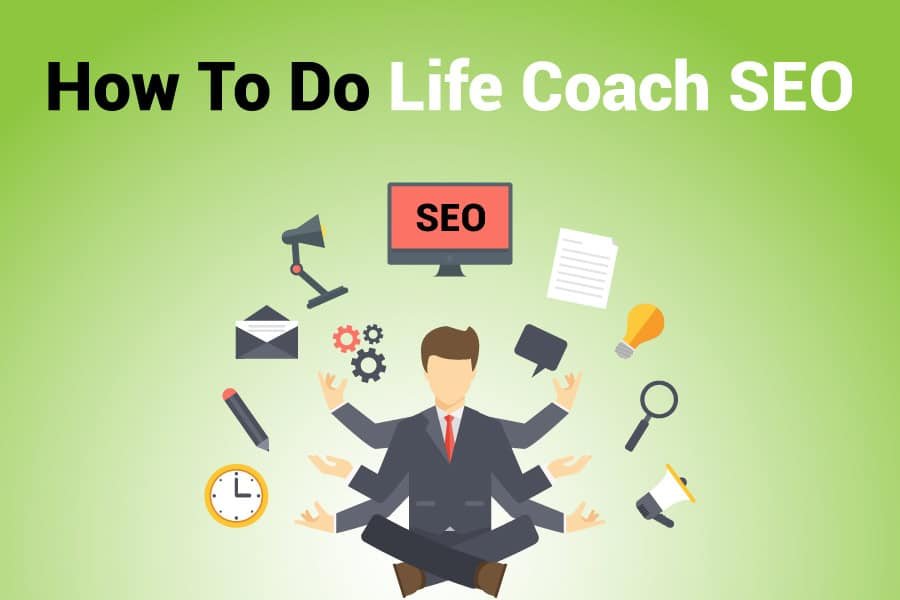
If you wish to manage your SEO projects by yourself or want to learn more about SEO for coaches, this section is a must-read. Here, you’ll learn the basic things you must do to make your coaching business a success.
1: Start with a proper SEO audit:

Starting an SEO campaign for a coach website without a proper SEO audit is similar to building a house with a low foundation on a piece of land that gets flooded. You know what could happen when the rain starts falling.
An SEO audit is like visiting the hospital to do a health check. You’ll know your health status from the check and various tests conducted. Additionally, when you discover that there’s an issue with your health, you can start the treatment.
Auditing a website helps you uncover issues that could hinder your website’s performance online. This will help you fix the problem and gain a competitive edge.
How do you run a thorough SEO audit? Here are some helpful suggestions:
Run your coaching website through an SEO auditing tool:
Several auditing tools are available. They’ll provide you with thorough details about your website.
Identify technical errors in your website:
Errors like your website performance, security, mobile-friendliness, search ranking, etc., are issues you can uncover via a proper SEO audit. One of the signs that your website is due for an audit is when visitors don’t spend ample time on your website.
Uncover the website’s SEO issues:
After addressing the technical SEO, your website’s on-page SEO should be the next. You must check the meta description, image alt text, and others here. Check the quality of backlinks, keyword use, and other SEO-related aspects of your website.
User experience and design analysis:
Your website design is essential. It can have a significant impact on your website’s UX. So, how do visitors rate your website? What part of your design do most of your visitors interact with? In other words, what aspects of your website’s design attract visitors’ attention the most?
Some software boasts a heatmap to help you understand how your design impacts your website’s search engine optimization efforts. You’ll also have a proper understanding of your website’s UX.
Run a thorough assessment of your website’s content:
Analyze your content to know how each compares to your competitors. Check the content on your blogs, and website’s home page.
A big question you should ask yourself when analyzing your website’s content is the position of the content on the search engine results pages. Are the contents ranking in the search results pages? Is there something you can do to make your content rank high?
In other words, can you make any content underperforming to do better? If yes, then how will you go about it?
You can only start thinking about a solution after identifying the issue, right? So, audit your content to know the problems hindering you from ranking.
Issues like keyword stuffing, keyword cannibalization, and others can make it challenging for a website to rank high.
Using website audit tools, you can get a comprehensive report of your website’s performance in search engines. So, before you initiate any search engine optimization campaign, thoroughly audit your website. With this, you’ll know where to focus your attention.
2: Find the best life coach keywords:

After auditing your website, finding the best SEO keywords is the next thing to focus on.
What are life coach keywords?
Keywords are the same, whether for life coaches or other businesses. People use keywords to find information, products, or services online.
Google operates on keywords. It uses a unique algorithm to rank coaching websites and others.
When Google crawls websites, it uses what it calls “spiders.” And while these spiders are innovative and efficient, they aren’t intelligent enough to read your content word for word.
So, how do Spiders understand the context of your content? In other words, how will they know what you’re writing about? Good question!
The answer is keywords! Your keywords help spiders to understand the context of your coaching website content. That way, Google algorithm can determine where to rank your content in the search results.
How can you find the best life coach keywords?
You can find keywords using tools (free and paid tools). Software like Semrush is a paid tool. But it can offer you an impressive life coach keywords list.
There are other free SEO keywords research tools you can use:
- Ahrefs
- Google Keyword planner
- AnswerThePublic
- Google Trends
Paid SEO keywords research tools like Semrush offer more insight into each keyword. You’ll find details on keyword difficulty, search volume, and cost per click.
Tips on finding the keywords for life coach:
Here are some tips to consider when conducting keyword research. These tips will guide you in making the best decision for your life coach website SEO.
Find keywords with huge potential:
How do you know a keyword with great potential? The first is to conduct SEO keywords research. The keyword research tool will showcase several keywords and details to help you make an informed decision.
You should be able to identify keywords with good prospects from information such as search volume. So, check the search volume of each keyword to know if you’ll get website traffic when you target a keyword.
Get long-tail keywords:
Two types of keywords exist in terms of length: short-tail and long-tail. The short-tail keywords include a few words and have a higher search volume. An example is “life coach.”
Ranking a website with short-tail keywords is possible but very difficult. It will take a long time to rank for short-tail keywords and even longer when someone without experience is in charge of your SEO campaigns.
Long-tail keywords are longer than short-tail keywords. Examples of long-tail keywords include “best life coach [your city].”
Long-tail keywords have a lower search volume than short-tail but are a wise choice if you want to rank quickly. You should also know that long-tail keywords have different competition levels. While some might be easier to rank for, others might be harder.
What keywords should you target?
Endeavor to target long-tail keywords. Furthermore, your keyword should relate to your niche.
A Handy Tip: You can sprinkle short-tail keywords in your content. But let long-tail keywords be your primary keywords. Use a keyword with a reasonable search volume.
Choose a niche:
The keyword “life coach” is too generic. You have to niche down. Why? Choosing a niche helps to reduce the competition and makes it easier for you to rank quickly.
There are different types of life coaches. These are:
- Relationship coaches
- Business coaches
- Spirituality coaches
- Finance coaches
- Executive coaches
- Sex coaches
- Nutrition coaches
- Retirement coaches
- Confidence coaches.
- Career counseling coaches
- Personal development coaches
- Health and wellness coaches
- Recovery coaches
- Agile coaches
- Divorce coaches
- Mindset coaches
- Accountability coaches
- Parenting coaches
- Team coaches.
So, what type of coach are you? That is the question you need to ask yourself. Define your niche. Why? Besides helping to reduce the competition, niching down will help you establish yourself as an authority in your niche.
Potential coaching clients know you cannot be all the types of coaches at the same time. It is not possible. So, focusing on a specific niche and growing your reputation there will make more sense.
7 Keyword Mistakes SEO Professionals Make: You can avoid them
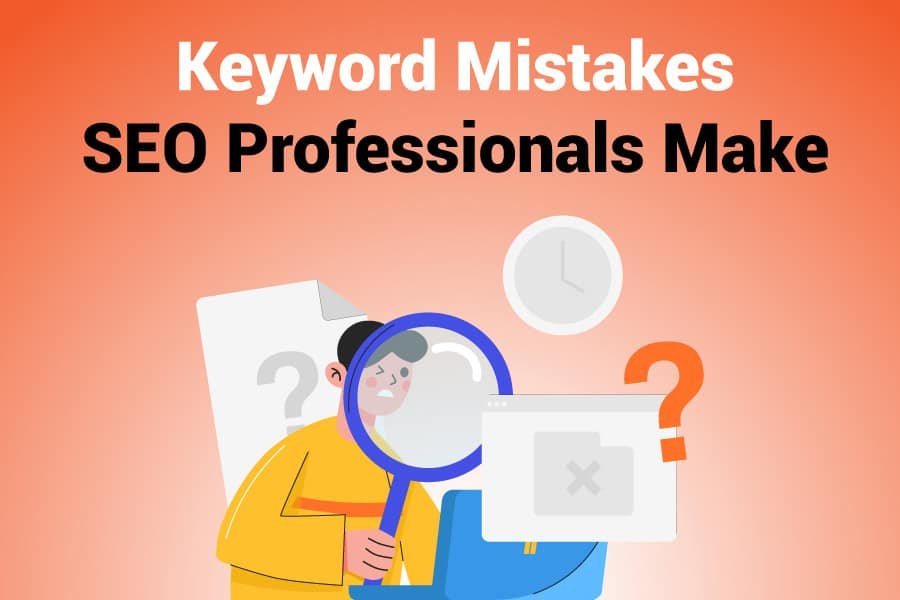
Keyword research is significant, but it doesn’t end there. There are a ton of mistakes you can make when trying to optimize your content with a keyword.
Let’s discuss the various mistakes people make regarding keyword usage without further ado.
Neglecting localized keywords:
This common problem can cost you a lot of local traffic opportunities. Localized keywords imply keywords that focus on your geographical location.
For instance, if you operate in New York City, your keyword can be “New York City life coach” or “life coach in New York City.”
When you target such keywords, potential clients seeking a life coach in that location will find you easily and hire you.
Irrelevant keywords:
For instance, you wrote an article about “how to become a life coach,” but the keyword is about comparing “Life coach vs. Lawyer.” In the worst-case scenario, most people would even use an utterly irrelevant keyword.
That is wrong! Your keyword should be 100% related to the content you’re writing. Otherwise, you’ll lose a great opportunity to rank high. Google hates it when you target the wrong keywords and mislead users, including search engines. Keep that in mind.
Neglecting keyword research:
Proper keyword research is essential and will continue to be. Unfortunately, most people think they can skip keyword research or guess the keywords to target.
However, keyword research is fundamental. It will showcase the search terms your prospects are using, the questions they are asking or likely to ask, and more.
You’ll also learn about the search volume of the keywords and identify keywords with great potential. Without research, you may mistakenly target keywords people aren’t searching with.
Targeting only one keyword:
Here is a scenario that most people can relate to. You wrote great content, but unfortunately, you only targeted one keyword. Of course, you could rank for the said keyword. But, did you know you’re missing great opportunities to rank for other keywords? That’s the fact!
You can rank for other related keywords or search terms. So, stop targeting only one keyword. Try to include related search terms.
Keyword cannibalization:
This happens when you target a keyword on more than one web page. For instance, you used the keyword “SEO for personal development coaches” in a blog post and used the same primary keyword in two or more blog posts.
You’re undoing your SEO success and getting on Google’s nerves with this move. Note that when you do such, it will negatively affect your ranking. Besides, Google won’t know which page to rank.
So, avoid keyword cannibalization. But if it happened mistakenly, try to fix it.
Avoiding competitive analysis:
Are you keeping a keen eye on your competitors? If you aren’t, start doing so right away. When you monitor and analyze your competitors, you won’t be far behind when they release a new product or publish new content.
Competitive analysis will help expose you to keywords your competitors are ranking for and give you ideas on their backlink profiles.
Luckily, you can use many tools to conduct competitive analysis. For example, Semrush is a great tool that can help expose you to steps your target audience deployed to rank high.
Changing singular to plurals and vice versa:
Are the keywords “Houston life coach” and “Houston life coaches” the same? The answer is no! One is “life coach,” singular, while the other is “life coaches,” plural.
Most people would mix both keywords up, thinking they are the same. But in reality, they aren’t the same. So, stop changing keywords. Use them the way they are in the keyword research tool.
Sometimes, some keywords might not sound grammatically correct. But use them like that. Once you change a single letter from a keyword, you have changed that keyword entirely.
So, these are the mistakes people make concerning keyword usage. Avoid them if you want your content to rank high.
3: Publish high-quality and valuable content:

Decades ago, Bill Gates said, “Content is king.” Today, this statement from Microsoft’s boss hasn’t changed. You can’t optimize your website or rank without content.
Make your content high-quality, valuable, and informative. Show your audience that you have the skills, knowledge, and experience to solve their problems. Let your expertise reflect in your content.
Can I outsource life coaching content to a writer? Yes, you can.
The SEO agency you are hiring should have writers with experience writing in your niche and can produce quality content. The writer should also be able to write the content in your brand voice.
What is the first thing to do when writing content for life coach SEO?
The first thing is the keyword. Find a suitable keyword and build content around it. In other words, your keyword should be related to the topic.
Speaking of topics, you must choose a killer title. In other words, make your title so catchy that website visitors will become super desperate to click the link and read the content.
If visitors don’t find your title interesting, they’ll think the same about your content. They’ll assume your content is boring, even when that isn’t true.
4 content writing mistakes people make: You can avoid them

Content writing is an integral part of your SEO campaign. Poor-quality content will negatively impact your website’s ranking and traffic, even with a high-potential keyword.
So, without further ado, here are mistakes people make in content writing that affect their SEO success.
Insufficient research:
Most people don’t even conduct research, while some do poor research. Even if you know the topic well, conduct in-depth research before you start writing.
When you research, you might encounter the latest ideas on the topic and have a stronger argument. The research will expose you to what your competitors have produced on the topic and how you can make your content superior.
Thin content:
Thin content also called “shallow content” is when the content offers no added value to readers. The content may have a lower word count, poor structure, quality, and grammatical errors in most cases.
Your contents have to offer value to readers. Readers should be hungry for more. They should be looking forward to your next content.
A Handy Tip: Your content should be 100% unique and information-packed. Readers should be able to solve their problems after reading your content.
Conduct thorough research before you start writing any content. Use the research to gather more knowledge on the topic. With this, you can write like an expert in the field. And that is what gets readers excited and makes them trust you.
Place your keywords naturally in your content, and use captivating titles and short sentences. Focus more on using active voice and make your paragraphs shorter.
Understand that Google knows high-quality content. The search engine giant can gauge the quality of your content via dwell time. Another important metric that gives Google an idea about the quality of your content is the bounce rate.
Skipping proofreading:
Many writers don’t bother to double-check their content before publishing. Most trust their writing skills and don’t believe they need proofreading.
Proofreading is necessary! It doesn’t matter if you had straight A’s in English Language in your school days or have been a content writer all your life. There are errors you can make due to parallax. So, proofreading will help you identify and correct grammar mistakes that can turn off your visitors.
Making the content promotional:
We aren’t saying you cannot promote your product or service in your content. You can. However, there are cases where you may overdo it and give your visitors the impression that you’re trying to play on their intelligence. It turns most readers off.
Promotional content would offer no value to the users. Instead, it only focuses on your brand.
If that has been the case, start making the changes now. Focus on adding value, then introduce a CTA at the end of the content.
4: Build a healthy backlink profile:
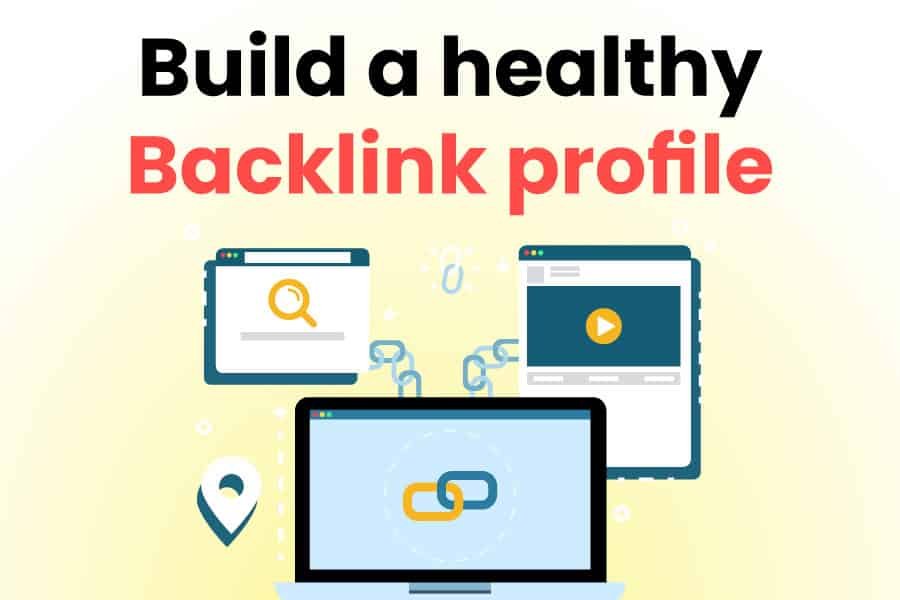
You have conducted an SEO audit for your life coach website, researched keywords, and produced stunning content. Now, the next step is to build a healthy backlink profile.
Backlinks are among the top ranking factors Google uses out of the 200+. It involves inserting a link from your website into another website (belonging to someone else).
Backlinks serve as a vote of confidence on your webpage. It is more like a symbol of approval and recognition from an authority and niche-relevant website to yours.
4 mistakes to avoid when building backlinks: You Can Avoid Them
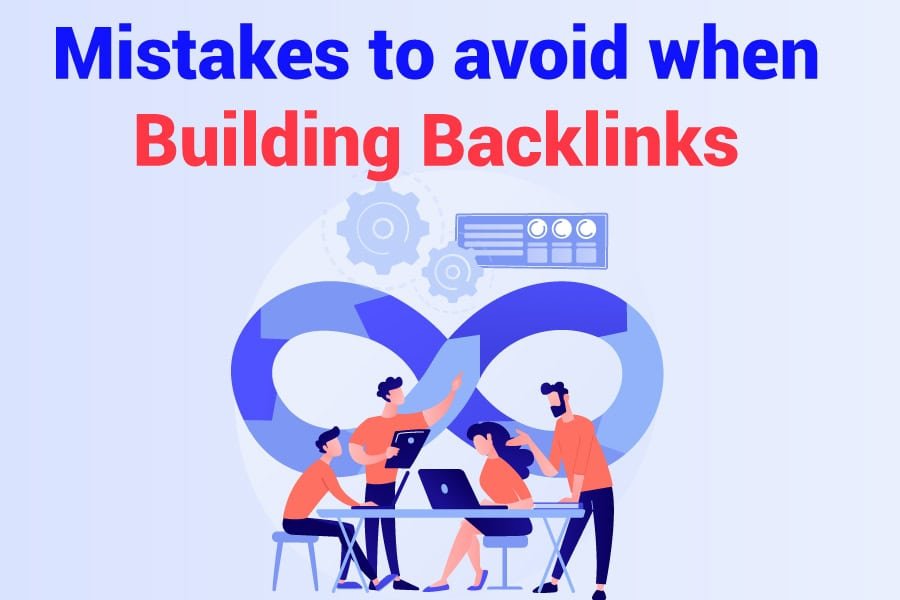
Prioritize quantity over quality:
Most people want to build thousands of backlinks within a short time. They don’t care about the sources of their keywords. All they care about is the volume.
Unfortunately, Google doesn’t care about the number of keywords one has, mainly if they are irrelevant and of poor quality. So, building thousands of backlinks overnight is a waste of time.
A Handy Tip: Build your backlinks gradually; take your time. Build hundreds or thousands of backlinks in a short period. Google knows this isn’t possible via legal means.
Acquire your backlinks gradually. This way, Google will assume that you’re gaining popularity gradually.
Ignoring relevance:
One of the critical qualities of high-quality backlinks is relevance. You and the website from which you get the links must be in the same niche.
Ignoring keyword relevance will get you nowhere. Targeting irrelevant keywords won’t even have any impact on your website ranking.
So, consider niche relevance when hunting for keywords.
Neglecting no-follow backlinks:
No-follow links do not add value like PageRank to a website, but that doesn’t mean they are worthless. They still add some value in the form of traffic.
Neglecting no-follow links can harm your SEO efforts. Why? Google isn’t stupid. These search engines know all your backlinks can’t be do-follow.
A healthy backlink profile has a balance of no-follow and do-follow links. Both links can be in the ratio of 60 to 40 (do-follow and no-follow, respectively).
Poor quality guest posts:
If you are used to posting poor-quality guest post content because you know the website owner would publish it that way, you must stop doing that. Your content should be high-quality and valuable to readers.
Additionally, avoid acquiring backlinks from spammy websites. You’ll only hurt your SEO success in the process.
5: Focus on Local SEO:
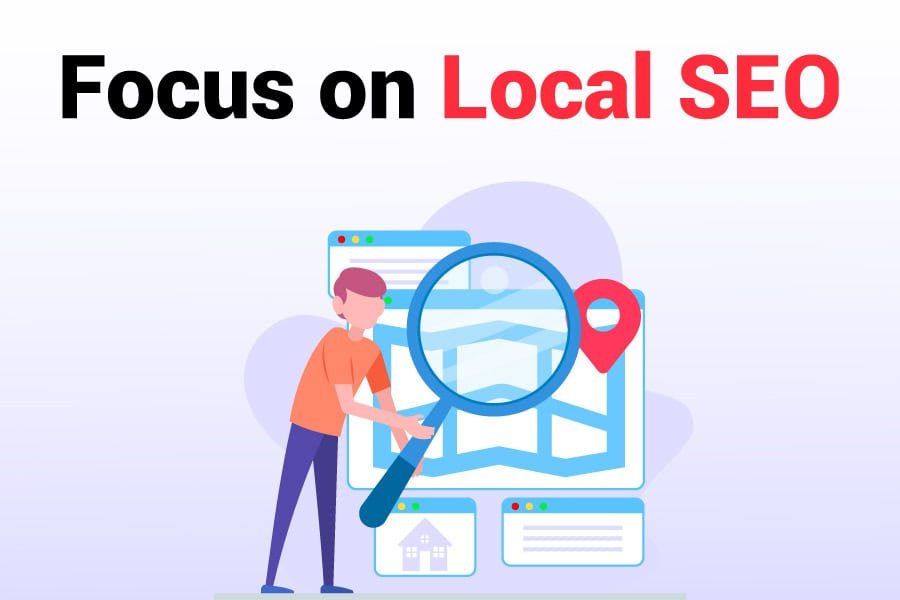
In 2022, 98% of people used the Internet to find information about local businesses. A study as far back as 2019 reports that one-third of online consumers use the internet to search for local businesses daily.
These statistics demonstrate the effectiveness of local SEO. When you optimize for local search, prospects from your location will find and contact you online.
There are two ways to go about local SEO:
Target local keywords:
- These include keywords that have location-specific phrases. An example is the best business coach in Chicago. When you optimize your website with local keywords, people from your area actively looking for a similar product will find you easily.
- Add your website to online directories:
Create a well-optimized Google Business Profile for your life coach business. You can create one yourself or let an expert do it for you.
Your Google My Business profile should include your contact information, address, and other relevant details about your business.
A Handy Tip: Your Google Business Profile allows customers to give you reviews and rate your services. So, ensure you get reviews from everyone you have provided coaching services to.
A study has hinted that 45% of potential customers won’t purchase a product or service without reviews. Furthermore, 98% of potential customers consider reviews part of the decision-making process when buying a product or service.
So, reviews are essential and can build potential clients’ confidence in your brand. However, positive reviews will impact your business more significantly than negative ones. So do everything you can to get positive reviews.
If you eventually get negative reviews, respond to your unsatisfied customers politely and professionally. Make the customers understand that you are willing to help them fix the problem as quickly as possible.
Conclusion
Performing SEO for life coaches is an essential strategy for those looking for new clients. Life coaches SEO will place your business in front of potential coaching clients.
Search engine optimization has great benefits for your life coach business. Many people are searching online for a reliable life coach to hire and will only contact websites that appear in their search results.
You can make your life coach website one of those potential clients will find online. Just follow the steps we discussed in this post.
However, if you don’t have the time and skill to do SEO, BitChip Digital is available to help. With experience and cutting-edge tools, we can improve your online visibility so you can start getting more clients online.
